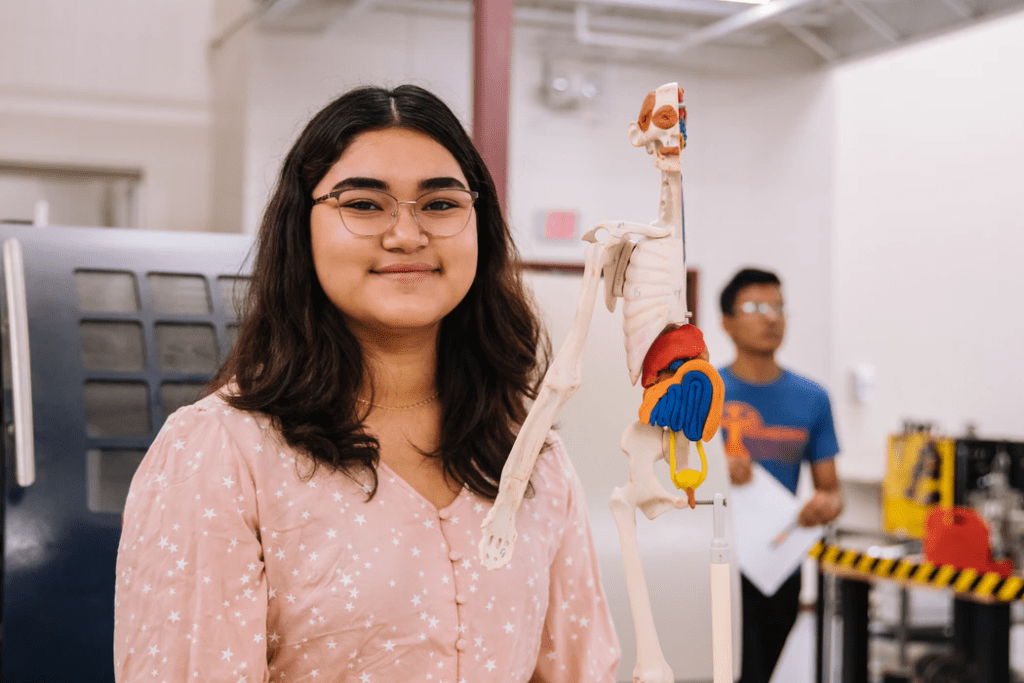Earning a Bachelor’s Degree in Health Sciences is an extremely effective method of joining the growing healthcare field. It is especially useful if you don’t want to take the plunge right into medical school.
Just because you aren’t a full-blown doctor doesn’t mean you can’t accomplish great things. Another benefit of majoring in health sciences is its widespread presence in traditional universities and community colleges.
You could major in radiology in community college and land a fruitful job in a doctor’s office or hospital. Or you can transfer credits and finish a Bachelor’s Degree in Health Sciences at a famous university. But, what exactly is a health sciences degree?
What is a Health Sciences Degree?
Health science is a broad term. It applies to a large number of ways healthcare is delivered through the application of science, math, and engineering. Health science deals with nearly every aspect of healthcare.
A Bachelor’s Degree in Health Sciences may not be as well-known as business or accounting degrees, but it’s the backbone of the healthcare industry. Many famous institutions offer an Associate Degree in Health Sciences. These schools then allow you to transfer credits to a four-year college or university to complete your bachelor’s degree. This is an essential step for many students fresh out of high school.
There are a few things you can count on while striving to earn your Bachelor’s Degree in Health Sciences. Many if not all programs are around 120 credits and consist of a curriculum with core courses. These core courses generally include the following:
- Health care economics
- Health informatics
- Microbiology
- Public health
- Epidemiology and biostatistics
- Ethics
Along with these core courses, you will also complete general education classes dealing with math, English, and science. Many of these degree programs also require students to complete internships and capstone projects to put their knowledge and skills to the ultimate test.
Upon graduation, you’ll find healthcare is also a stable career field with many positions to pursue and a high level of hob security. Whatever career path you choose, earning a Bachelor’s Degree in Health Sciences from one of the top programs listed below opens the door to a fantastic number of job opportunities.
Best Bachelor’s Degree in Health Sciences Programs

Let’s now look at some of the more notable bachelor’s degree programs for health science majors.
The University of Southern California
USC is one of the premier universities in the country. Known for its prowess in nearly every field, it’s no surprise it offers a great health science program. USC puts a lot of emphasis on research. USC’s bachelor’s degree in health sciences is lauded by experts and students alike. You will take hands-on classes like:
- Drugs, Disease, and Medicine in History
- Principles of Psychobiology
- Behavioral Neuroscience
- The Family in a Changing Society
It also offers different modules of education concentrations, and require students to focus 16 credit hours on the following:
- Health
- Gender, & Ethnicity
- Health & the Mind
- International Health
- Sociology of Health
- Health & Aging
- Biology of Health
Boston University
Boston University is a private research university that offers its students amazing resources in the form of internships, job opportunities, and more. Health science majors will take classes at The College of Health and Rehabilitation Sciences.
It also has a unique study abroad program. It allows students to travel the world and examine healthcare settings in some of the most prosperous European countries.
The core courses at Boston University are:
- EpidemiologyGenomics in Public Health
- Germs and Genes
- Global Maternal & Child Health
Rutgers University
Located in New Jersey, Rutgers University is a celebrated institution that offers a diverse health science major. Some of the most notable classes in the major are:
- Cultural Issues in Health Care
- Health Care Organizations
- Magnetic Resonance Imaging
- Principles of Scientific Inquiry
This is a hybrid program, meaning that at least 15 credits are completely online. The rest of the credits are earned on campus. You can customize your health science major by focusing on several concentrations. Dental, health management, imaging services, or psychiatric rehabilitation are a few of the available concentrations.
Ohio State University
Aside from its famous sports programs, OSU is no slouch in the education department. It is one of the largest medical research universities in the country. Some noteworthy classes are:
- Health Care Management and HR
- Critical Phases of Life
- Health Care Delivery
- Cultural Differences in Clients
You can even earn an online health science degree. These offer flexible and varied opportunities for those with a busy schedule or home life. OSU offers one of the more diverse health science majors. It caters to a number of students who want a more flexible schedule.
University of Florida
The University of Florida is a world-renowned research university with a presence in the medical field. Its health science bachelor’s degree program will take 120 credit hours to complete. It also allows students to major in extremely specific fields within health science. Some notable classes are:
- Pathophysiology
- Disease and Disability
- Therapeutic Communications
- Applied Kinesiology
These specific classes help students gain access to specific job roles upon graduation.
Bachelor’s Degree in Health Sciences Career Prospects

The healthcare field is ripe with lucrative job opportunities for those willing to put in the work. After earning your Bachelor’s Degree in Health Sciences, you can pursue many fantastic career paths.
Below are the best jobs available with a Bachelor’s Degree in Health Sciences, according to the Bureau of Labor Statistics.
Athletic Trainers
- Median Pay: $48,440 per year
- Typical Entry-Level Education: Bachelor’s degree
- Number of Jobs in 2018: 31,100
- Job Growth: 19% (Much faster than average)
- Highest-paying States: Washington, D.C., Hawaii, Connecticut, Texas, Massachusetts
- States With the Highest Employment Level: Pennsylvania, Illinois, Florida, Texas, New York
Athletic trainers assist others in treating, preventing, and ultimately diagnosing bodily injuries. Athletic trainers can be found in a variety of different healthcare settings and have a diverse clientele. You will need an impressive amount of health information and knowledge of medical terminology to succeed as an athletic trainer.
Along with a Bachelor’s Degree in Health Sciences, you will need a license or certification to become an athletic trainer. Athletic trainers are in high demand and the occupation has a staggering amount of growth potential. Getting certified and working as an athletic trainer could be an ideal career move.
Clinical Laboratory Technologists and Technicians
- Median Pay: $53,120 per year
- Typical Entry-Level Education: Bachelor’s degree
- Job Growth: 11% (Much faster than average)
- Highest-paying States: Alaska, Rhode Island, Connecticut, New York, Oregon
- States With the Highest Employment Level: California, Texas, Florida, New York, Pennsylvania
These individuals spend hundreds of hours analyzing samples of fluids, bodily tissues, and more. You would most likely be working in a hospital environment. This career choice typically requires a bachelor’s degree and a certificate or a license, depending on what company you join.
This is a career that is growing each year by leaps and bounds. There is no shortage of demand for clinical laboratory technologists and technicians in the healthcare industry.
Dietitians and Nutritionists
- Median Pay: $61,270 per year
- Typical Entry-Level Education: Bachelor’s degree
- Job Growth: 11% (Much faster than average)
- Highest-paying States: California, Alaska, Massachusetts, New Jersey, Hawaii
- States With the Highest Employment Level: California, Texas, New York, Pennsylvania, Florida
Dieticians and nutritionists harness their knowledge of food science to help individuals eat better. They study chemical reactions, bodily functions, and more to get the most out of dieting.

"Career Karma entered my life when I needed it most and quickly helped me match with a bootcamp. Two months after graduating, I found my dream job that aligned with my values and goals in life!"
Venus, Software Engineer at Rockbot
In nursing homes, dieticians can fashion specified diets to help elderly residents who struggle with eating solid food or have diabetes. Dieticians and nutritionists use their knowledge and skills to make the perfect meal plan.
Dietitians and nutritionists will enjoy an extremely fast-growing field and can count on job security. You will find them in several healthcare settings like hospitals, nursing homes, and clinics.
Becoming a dietician or nutritionist will require a Bachelor’s Degree in Health Sciences and an internship. You will be required to be certified and licensed.
Recreational Therapists
- Median Pay: $48,220 per year
- Typical Entry-Level Education: Bachelor’s degree
- Job Growth: 7% (Faster than average)
- Highest-paying States: California, Washington, D.C., Hawaii, Washington, Connecticut
- States With the Highest Employment Level: California, New York, Texas, Pennsylvania, Massachusetts
Recreational therapists craft and implement in-depth recreation activities for people who suffer from illness, disability, and physical limitations. Recreational therapists are in a ton of different healthcare settings like nursing homes and hospitals. They combine physical therapy and creative knowledge and skills to improve the quality of life of their clients.
Occupational Therapists
- Median Pay: $84,950 per year
- Typical Entry-Level Education: Master’s degree
- Job Growth: 18% (Much faster than average)
- Highest-paying States: Nevada, California, New Jersey, Arizona, Washington, D.C.
- States With the Highest Employment Level: New York, California, Pennsylvania, Texas, Florida
One of the fastest-growing careers in the country, occupational therapists help those with disabilities, acute injuries, and illness overcome adversity. Through everyday acts, they can help those with disabilities better acclimate back into a healthy state of living.
Many occupational therapists operate out of their own offices or practices. Others work in other locations in the healthcare industry. However, earning a Bachelor’s Degree in Health Sciences won’t get you all the way there, unfortunately. You will often need a master’s degree to become a fully-fledged physical therapist.
Is a Bachelor’s Degree in Health Sciences in Your Future?

Becoming a health science major is one of the best decisions you can make if you are interested in healthcare. It will allow you to land a job in the medical field without the hassle of medical school.
You have many options: occupational therapist, lab technician, health services manager, radiologist, or dental hygienist. Earning your Bachelor’s Degree in Health Sciences is a surefire way to land a secure and rewarding job.
About us: Career Karma is a platform designed to help job seekers find, research, and connect with job training programs to advance their careers. Learn about the CK publication.
